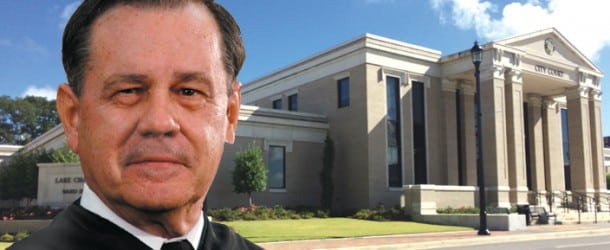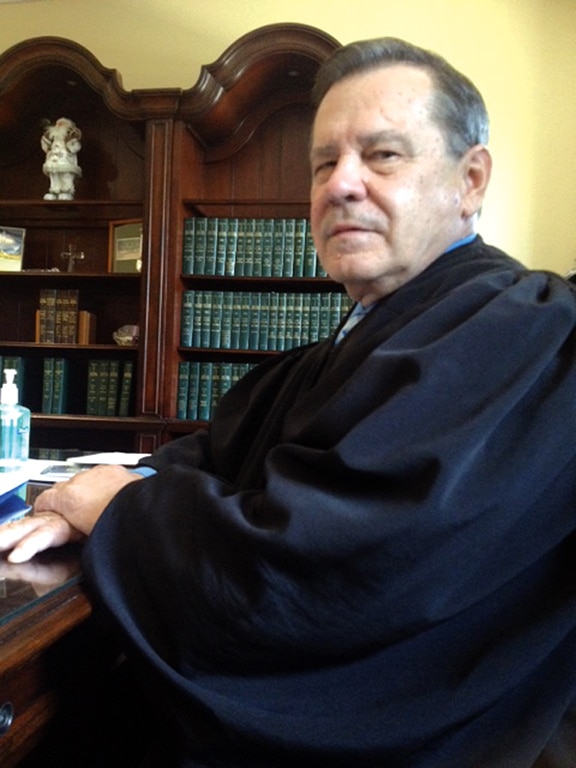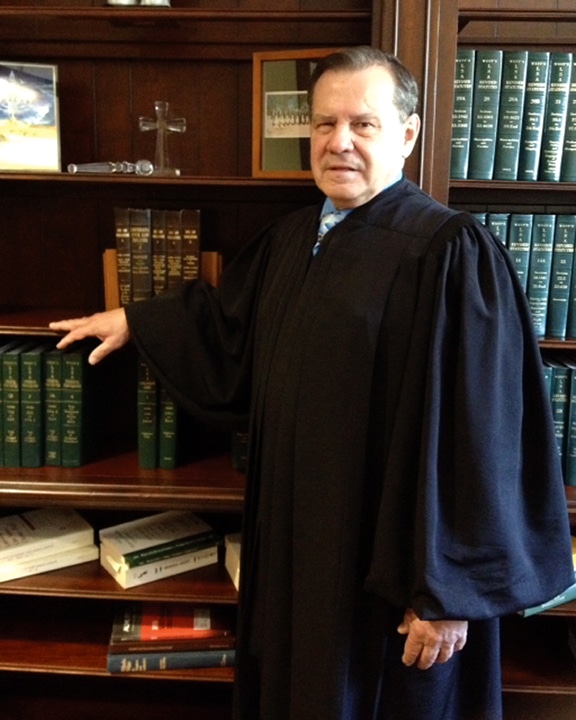Photo by Terry Robideaux
Big Shoes Are Left To Fill As Judge Tom Quirk Prepares For Retirement After A Legendary Career
Louisiana’s primary election is Nov. 4. Along with several new candidates for judicial seats, voters will vote on the mandatory retirement age for judges.
The current mandatory retirement age for judges in Louisiana is 70. On the November ballot is a bill to repeal this mandatory retirement age. The bill passed the Senate by a 34-0 vote. This law directly affects Lake Charles Ward 3 Judge Thomas P. Quirk, who turns 70 in November. Under the present ruling, Quirk is required by law to retire by Dec. 31.
Quirk has presided over the Lake Charles City Court since 1979, when he became the youngest sitting judge in the city’s history. He now holds the record for being the longest-sitting judge in Lake Charles. Over his years on the bench, Quirk has been responsible for many positive — and controversial — changes within the court.
Quirk, a 1962 Lake Charles High School graduate, earned an accounting degree from Louisiana State University. In 1969, he graduated from Louisiana State University Law Center. He considers three men to be the most influential in his decision to become a judge: Judges Edwin F. Hunter, Jr., Woody Thompson and Murray Anderson.
Fresh out of law school, Quirk worked as a law clerk for Hunter, Jr., who was at that time the longest-sitting U.S. District Court judge. Quirk calls Hunter, known for his civil rights rulings, the kindest man he has ever known. Hunter, Quirk says, was a gentleman. And his outlook on life, his common sense and his philosophy influenced Quirk greatly.
Quirk then worked with city judge Woody Thompson in Sulphur. Thompson, Quirk says, taught him plenty about what it means to be a judge. Finally, judge Murray Anderson allowed Quirk to take his place on the bench, and Quirk gained hands-on experience and knowledge in being an effective city judge.
These three men greatly influenced Quirk’s outlook, and showed him how productive a person can be and how much good a judge can accomplish if he’s willing to put forth the effort.
The first time Quirk ran for judge, he ran against Ralph J. Hanks, Jr., but was unsuccessful. The second time he ran, he faced Fred Patin, who was then a city prosecutor. When the votes were counted, Quirk had won — receiving 13,200 votes to Patin’s 13,000.
Once in City Court, Quirk began displaying his drive to improve the world around him. He began by implementing computers into City Court. Some were not happy with the change, as they were comfortable with the old way of doing things. Quirk enjoys technology, and even wrote computer programs designed to modernize the court. He says any tool that can serve people better is worth the time and effort.
“I’ll put Lake Charles City Court up against any city court in the United States,” Quirk says.
Quirk has been a mover and shaker, a man of honor and integrity. He’s not afraid to stir the waters if it’s the right thing to do. This includes changing standard sentencing regarding fines and incarceration. He wanted to offer the option of truly changing lives, and there were those that didn’t like it.
What Quirk is probably best known for is offering certain defendants the choice to attend weekly church services in lieu of jail time and fines. On the bench, Quirk has exemplified kindness and concern, not only for the defendants who stand before him, but for their families as well. What’s found in Judge Quirk’s courtroom is compassion. He’s a friend, not a foe, and he truly wants to help.
“The most difficult task as a judge is putting a person in jail. When you jail someone, you potentially cost them their livelihood, their family and their possessions. With me, jail is always the last resort,” Quirk says.
Quirk knows what alcohol and drugs can do, and he’s willing to take a chance to make the defendants’ lives better. He’s a modern day King Solomon, showing wisdom and mercy — something we all want for ourselves.
Quirk stresses that sometimes a person doesn’t recognize that they have a problem until they hit bottom, and sometimes that bottom is jail. Some of the defendants he sees in alcohol or drug recovery programs are there because he sent them to jail.
This new method of sentencing came about as Quirk considered the overcrowded jails. Families who relied on an incarcerated offender suffered, sometimes more than the jailed family member. Jails often seem to have a revolving door, and Quirk believes hearing the word of God would have better, more lasting results. The benefit of spiritual support can be great, so weekly church attendance became an alternative to jail. In 1992, Quirk initiated his alternative sentencing to those who were guilty of minor offenses and could not afford the fines.
Many didn’t like Quirk’s new sentencing, especially the American Civil Liberties Union, which charged him with gross misconduct, among other things. Keep in mind, Quirk never forced weekly church services upon anyone. Defendants could have easily opted for jail time and fines. Despite this fact, the ACLU filed a lawsuit against Quirk, and the case made it all the way to the Louisiana Supreme Court. A formal complaint was filed to get Quirk removed from the bench, but he remained true to his convictions. Using his own finances, he battled the ACLU and won. With a rare unanimous decision, all charges against him were dismissed.
Quirk is both a judge and an advocate, a man of God who speaks the truth. He understands the court from both sides, as he himself was tried before the courts and overcame much. He has paid a price, but has emerged a better man. He’s an advocate for those imprisoned within themselves due to addictions, or emotional or mental problems. He gives defendants an opportunity to be healed and released. Ultimately, because of Quirk, the Louisiana Supreme Court decided it was lawful to give defendants with addictions the options of 12-step programs, church services or community service as part of parole obligations.
Quirk is a member of the American Bar Association, the Southwest Louisiana Bar Association, Louisiana City Court Judges’ Association, Louisiana Counsel for Juvenile and Family Court Judges, the American Judicature Society, the Southwest Louisiana Christian Legal Society, Professional Mediation Association, National Lawyers Association, the Chamber of Southwest Louisiana, Full Gospel Businessman’s Club and Christian World church. In addition, he was the recipient of the 2010 Samaritan of the Year Award. Quirk is a man who talks the talk and walks the walk.
Because of present guidelines, Quirk will retire at the end of this year. Asked if he would run again in six years if the current law were repealed, he quickly said, “Yes! If an opening came up, absolutely. I enjoy being a judge. As long as a person can function and do their job, I don’t think age ought to have anything to do with it.”
Quirk went on to explain that the Louisiana Judiciary Commission would remove any judge from the bench if he were not servicing the office appropriately. In addition, if the public doesn’t approve of a judge’s performance, they can remove him by not re-electing him. Thus, the mandatory retirement age for judges is actually unnecessary. And don’t forget the importance of experience!
“When you’re a judge, you have to remember you’re dealing with people. As you get older, you understand more. I feel like I’m in a better position now to serve than I ever was.”
If you want Lake Charles City Court to continue down the path Quirk paved, and keep a judge who continues the tradition of sentencing church services to those who fit the criteria, then do your homework, and find out where the candidates stand on this issue. We want a compassionate and caring judge presiding over troubled lives. Mandating a defendant to attend church will ensure he or she hears God’s word. This benefits the defendant, the family and the community.
When asked if he had one last comment to the residents of the city of Lake Charles, Quirk, without hesitation, replied, “Love your neighbor as yourself.”

















Comments are closed.